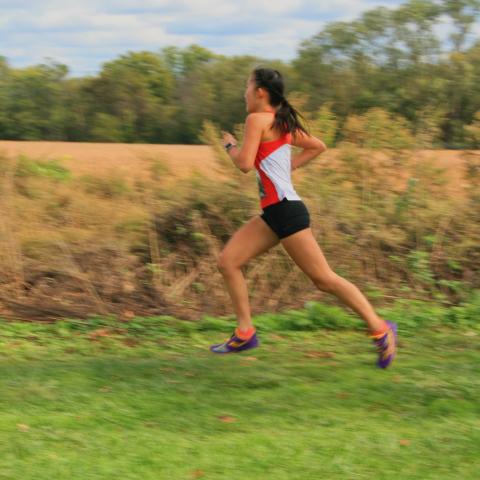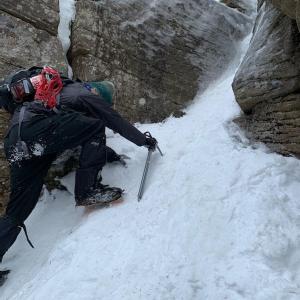Cornell Students Share a Guide to Getting Outdoors this Winter
“The science is really clear that spending time in nature benefits your mind and body. Intentional connection with nature allows your brain to rest and recover from intense focused academic work. It also allows you to relax and enjoy the moment using all your senses,” says Catherine Thrasher-Carroll, Mental Health Promotion Program Director, Skorton Center for Health Initiatives at Cornell Health. “Getting out to spend time in nature with others can foster a sense of connectedness and community.”
Finding connection and community through nature is a concept that resonates with Cornell students Joanne Hong Wang ’24, Arryn Kenna Owens ’24, Hadi AlZayer ’20 MS ’22, and Toby Lidov ’23, and they are in agreement: Cornell's campus is rife with resources and ways to get outside for people of all skillsets. Cornell Outdoor Education (COE), for instance, offers Physical Education (PE) classes, equipment rentals for those who want to get outdoors but do-it-themselves, and a rock-climbing wall for those who want to stay indoors. Student organizations like the Cornell Outing Club (COC), Cornell Running Club, and Cross-Country Club all offer additional ways to get active outside while connecting with other students. Or, as Arryn says, “it comes down to just putting on your shoes, going outside and exploring campus.”
"Getting outside resets the system,” says Toby. He adds, walking around outside, the botanic gardens, for example, “provides an opportunity to forget about everything else and be outside. Some of my greatest friendships have emerged through a shared time outside.” Arryn elaborates, “There’s no wrong place to start. There are no requirements.” Though it can be nerve-wracking to take that first step. "It can be intimidating to jump into a new community where you feel like you don’t have the skills, but there’s so much inclusion for everybody. Even if you’re not ready to try a new sport or affiliate with an organization, just exploring Ithaca is a really good place to start” adds Arryn.
Each student we spoke with hopes to encourage other students to take advantage of all the resources Cornell has to offer.
Cornell Outdoor Education
Joanne refers to COE as a “hidden gem.” Feeling confined to her residence hall as a freshman entering in COVID-bound Fall 2020, her trail running PE course was great for her mental health. She was able to socially distance, but also engage with other students from across campus, and become familiar with the beautiful surrounding area.
For Arryn, the rock-climbing PE class she took Fall 2020 was one of the only and best ways to connect and meet new people and get out of our dorms, the highlight of her week, she says.
Less than a year later, Joanne and Arryn are now COE instructors, teaching trail running and rock-climbing, respectively. Joanne and Arryn agree that among the benefits of PE classes is the fact that the classes are geared to meet the needs of students of all abilities and interest levels. Further, COE continues to make a concerted effort to encourage and build diversity within its classes.
While courses are full for the semester, the COE Outfitting Department also provides great opportunities to get outdoors with quality, low-cost rentals – snowshoes, skis, outdoor clothing, and even micro spikes for winter hikes in the Adirondacks. Rentals are available on a walk-in basis, but they also accept reservations. Cross-country skis are harder to come by on the weekends due to class and club use, so make sure to make those reservations ahead of time, otherwise, equipment is typically available at the last minute.
Join a Student Organization
Looking for ways to get active and meet new friends? Outdoor focused student organizations are a wonderful place to start.
The Cornell Running Club meets every day depending on the time of year and is open to everybody. Joanne encourages students to come when you can, when you want. “At running club, you can join any day of the year.... I hope people know they can show up whenever they want and there’s no pressure or obligation to show up every day.” Come on Fridays for theme runs, or on Wednesdays to workout. For students interested in access to meets or marathons, this is a club for you, too. The barrier to entry is relatively low compared to some other sports – students only need to have a pair of sneakers. Visit their website to learn more.
The Cross-Country Skiing Club is inclusive of people skiing for the first time as well as students with D1-level skillsets. In the fall, the team does dryland training and the winter season kicks-off with a weeklong ski camp in Quebec, traveling regionally all winter to races. Arryn just returned from the Quebec trip where “[she] watched a bunch of new people ski for the first time ever… They just jumped in and signed up. It was great. It was amazing to be a part of.” Learn more about the club here.
The Cornell Outing Club is also open to anyone. “It’s easy to join,” says Hadi, “because anyone can lead a trip and it’s low commitment for people who don’t want to be on e-board. You just see whatever trips you are interested in and just sign up, and you can increase your commitment if you want.” COC runs formal and informal activities and trips, locally and regionally. COC is now able to offer scholarships for students who cannot cover trip costs. COC prioritizes reducing barriers to entry, President Toby Lidov says. A $10 due per semester gives members access to 1,400 square feet of equipment: canoes, kayaks, tents, and skis to name a few, “provided the trip you’re using [the gear] for is opened up to the rest of the club. It’s equal opportunity that way. We’ve done everything that we could to minimize barriers to using our gear and going on trips. That’ part of what makes our program really unique,” explains Toby. Students interested in joining can sign-up for the listserv by clicking here.
Where to Go (and What to Do When You Get There)
When you’re looking for places to explore, the list of where to go is lengthy, and many places are on or accessible from campus. If you are renting equipment for your outing, COE staff members and instructors are a wealth of information; simply ask for a recommendation when you arrive to pick up your rental. According to Rob Cook, Program Coordinator, Phillips Outdoor Program Center, the Cornell Golf Course is a great place for skiing and snowshoeing in the winter. He also recommends this local list of where to ski and Ithaca Trails website as a good source of ideas for all types of outdoor activity. Tip: If you’re interested in downhill skiing, Greek Peak has a student discount on Wednesdays.
When hiking locally, Hadi and Toby favor the Finger Lakes Trail, which runs NYC to Buffalo and within a couple miles of campus, Shindagin Hollow State Forest, Connecticut Hill, and Robert Tremen State Park. The Cornell Outing Club hosts a list of hikes on this page. Cayuga Trail starts on campus. For Hadi, the Finger Lakes National Forest and Cayuga Lake State Park are favorite local places to camp and canoe, respectively.
Joanne also suggests that even going for a short walk does wonders for mental health. “It’s a stressful time. Attending a school like Cornell is already difficult without the extra worries brought on by COVID,” she says, and getting outside helps. Joanne and Arryn recommend Cornell Arboretum as an easy place for a beginner to run or hike, as well as Monkey Run, which is accessible from campus. No car? No problem. Several of the recommended destinations can be reached by public transit.
What’s the biggest tip we received? Just get outdoors! For Toby, the outdoors has “always been an escape, a good way to forget about what’s happening, a good way to be present… It is worthwhile to spend time appreciating that we are not the only living things.” In regards to the more challenging hikes and outdoor activities, Toby says, “When you go through experiences and share hardship, it is one of the best ways to get to know people.” Joanne and Arryn are in agreement: when it comes to getting active outside, every day is a good day to start.



